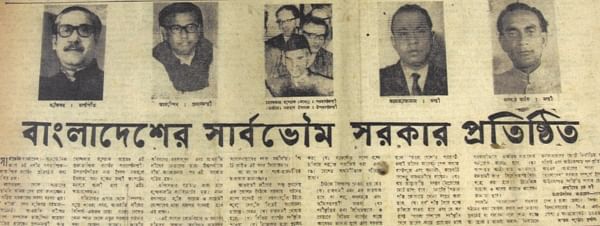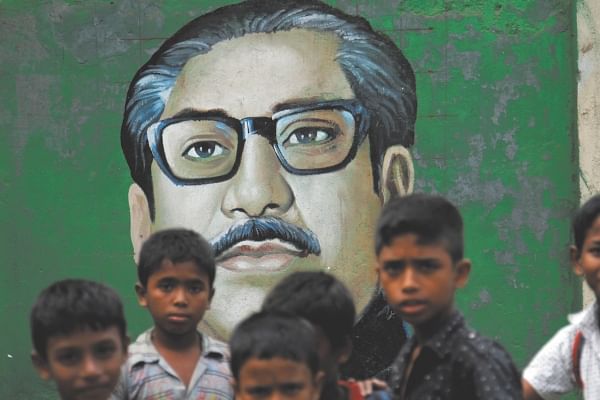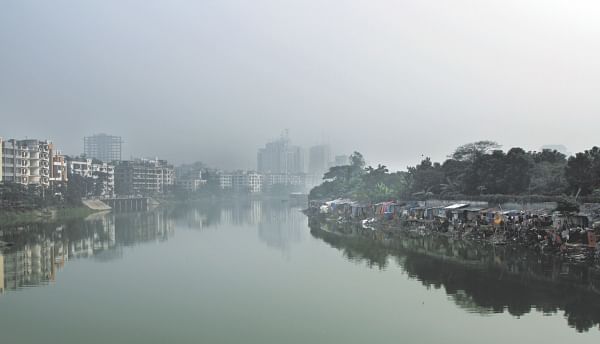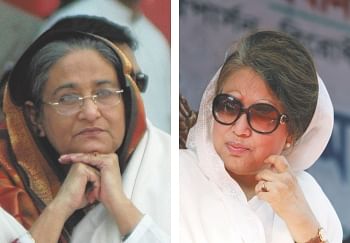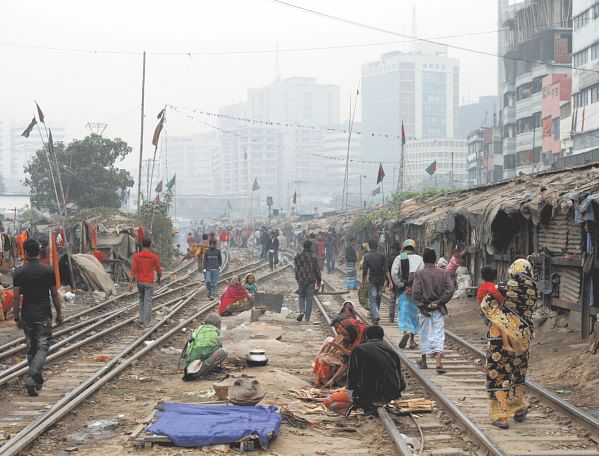| Home - Back Issues - The Team - Contact Us |
 |
| Volume 11 |Issue 12| March 23, 2012 | |
|
|
Special Feature
Beyond Freedom Forty years on, Bangladesh is still far away from embodying the Ahmede Hussain Spectres of Marx
Socialism as a state policy was quickly dumped after the brutal and barbaric murder of Bangabandhu Sheikh Mujibur Rahman in 1975. Before that, the country, under Mujib's leadership, had flirted with several strange forms of the planned and controlled economic system, all of which had failed to bring about the promised golden Bengal that the nation during the tempestuous days of the Liberation War had dreamt of. Wholesale nationalisation of industries along with massive bureaucratisation and mismanagement led to corruption, creating a new class whose incredible greed could not be satiated by the ceiling on investment capital that the government had set. Gen Zia, who usurped power in a bloody coup, took the country and its economy to another tragic end. Infusing corruption into politics, the deposed General's economic policy had witnessed a growth of the compradors, who invested their new loot on trading, both legal and illegal. If Zia's rule bred corruption, Gen Ershad's, which followed his, took it to a new height. Throughout the two dictatorial regimes that plundered the country and its economy, the masses remained in the margin. Be it politics or economy, Ershad followed his infamous predecessor's footstep closely, making policies where trading had been more profitable than investing, most lucrative was illegal trading, smuggling that is. In the two Generals' term in office, on an average, the country never witnessed a growth rate beyond four percent. It took the fall of Ershad's vile and despotic rule in a mass upsurge in 1990, ushering in the country's second bourgeoisie revolution, to open the door to the world economy. Foreign direct investment has poured in with the middleclass flexing its financial muscle. The country has boasted a growth rate of six percent, but whatever has trickled down to the masses has been a drop of manna in the wilderness of misery and exploitation.
Wholesale privatisation of the government-run banks and industries has robbed the country of a vital instrument to stabilise its economy. Cheap labour has lured many foreign buyers into the country's garment industry, which, together with foreign remittances sent by migrant workers, has remained the dynamo that has kept the clogs of the world's 43rd largest economy up and running. Still, inequality runs high and exploitation rampant. Capitalist development can never be homogenous, and in Bangladesh we see its most base and perverse face. In the capital, beside lofty, imposing skyscrapers stand lines of slums where children grow up stunted and malnourished. Even though the country has made some significant progress in improving the lot of its ordinary citizens, poverty still gnaws at empty stomachs– a seasonal famine still hurts its north-western region hard. In a country where free market is synonymous with kleptocracy, Karl Marx's relic has made a strange comeback: socialism has been reinstated as one of the four principles of the state. Marx once said, "History repeats itself, first as tragedy, second as farce." (The Eighteenth Brumaire of Louis Napoleon) Call it farcical if you may, but Bangladesh is the land of the unity of the opposites– establishment of a socialist society has remained the ultimate goal, but before that happens, Marx and Coca Cola, famine and fast food live together–and that too–peacefully. Compatible Bedfellows?
In Bangladesh, the secular divorce between the mosque and the state has never taken place. From Bangabandhu's quasi-socialist rule to Khaleda Zia's zealot-supported government, the religious minorities have never felt safe at home. Since independence, Bangladesh has witnessed numerous instances where Hindus have been evicted from their households and forced to leave the country. Women belonging to the religious minority have been raped and killed, at times even by members of the so-called secular parties. According to a judicial commission report, 200 Hindu women were gang raped after the general elections of 2001, allegedly by members of the Bangladesh Nationalist Party (BNP) and its junior coalition partner Jamat-e-Islami. The so-called Vested Property Act has just been repealed, yet chances are low that the 75 percent Hindu lands that have been seized are going to be returned to their rightful owner. It is true that compared to its Southasian neighbours, ordinary Bangladeshis enjoy relative religious freedom, but it has happened after a sad, silent migration of a huge number of Hindus to India. It is no surprise that the two big political parties in the country are also the biggest harbourers of Islam as a political ideology. In the last elections, both the Awami League (AL) and BNP vowed not to make any law contrary to Islamic sharia, and the AL, apparently the more secular of the lot, in the run up to the aborted elections of 2008, even promised to make fatwa legal. Presently, secularism cohabits peacefully with Islam as state religion, making a mockery of both. Nationalism goes Awry
Bangabandhu Sheikh Mujibur Rahman, who spearheaded Bangladesh's long walk to freedom, even told a Jumma delegation from the Chittagong Hill Tracts (CHT) to become Bengalis. What followed was an inevitable by-product of dominance and exploitation–people took up arms and fought a bloody and ruthless war, which at its fag end turned into a proxy war against Bangladesh by one of its biggest neighbours. A semblance of peace now exists in the CHT, where the 'Peace Treaty' has created a Chakma/Marma comprador class, a blessed handful who runs shops and small businesses, while the toiling masses in the hills, like that of their plain land counterparts, live in abject poverty and deprivation. The case of Bengali/Bangladeshi nationalism is indeed a curious one. It is the story of a people, who fought colonisation in a large swathe of its history, denying the fundamental rights of some of its own citizens on the pretext that they look different or speak a different language. Their fight for justice and freedom is integral to the class struggle of the ordinary Bengalis who live under the shadow of the lumpen bourgeois state. Buy the People The biggest strength of the country's democracy has been its people. Throughout its long and chequered history, the people of this country, like sentinels of democracy, have fought for their right to vote, pouring out into the streets in thousands whenever their right to choose leaders have been threatened. Their hopes and trusts have been repeatedly shattered by their politicians, but, like the proverbial phoenix, they have always risen from the ashes to rebuild their dreams of a better future. The Third Alternative Bangladesh has a vibrant and noisy civil society (CS), which at times does not shy away from making its voice heard. So far, it has never ventured into politics, and a strong citizen's movement that can challenge the existing social and political conditions is the order of the day. The CS has a lot of honest, competent, young leaders to steer the country into a bright, new beginning. Our future lies in cleaning our politics and creating a new leadership, the rest will follow suit. Copyright
(R) thedailystar.net 2012 |
||||||||
